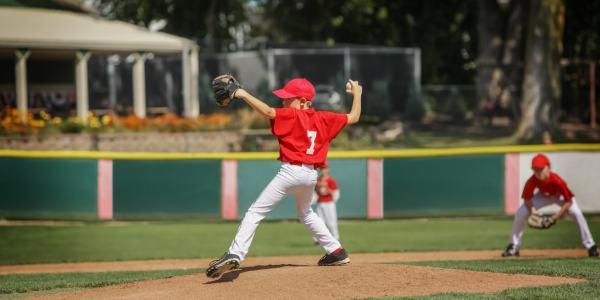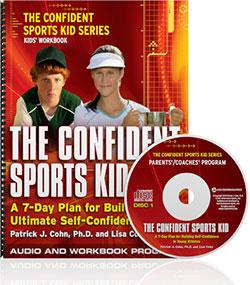
Competition is Inherent to Sports
And competition is everywhere — not just in sports. Kids compete on the playground, with siblings, and even in school. Some young athletes thrive on competition and truly enjoy it. Other athletes may fear competition or be afraid to take risks.
Competition is all about competing for a prize or to win a game. It’s a test of an athlete’s ability against other athletes. Most athletes are excited about competing. However, some kids are intimidated by competition and this can be frustrating for many parents. Here is an example:
“Our son has always been a go-getter on the basketball court, but this year we could see he would hold back. He has always been a starter, but this year he was not. That was a huge blow to him. We know that if he applies himself like he did in the past, he can be a starter and feel better about himself. He is 13 years old, and next year will be in the 8th grade (his last year playing at the junior high level). We hate to see how defeated he was this year, how he seemed to hold back, not getting in there and being the assertive player we always knew him to be.”
Instead of holding back like this, kids should embrace the feelings associated with competition. In some cases, parents may experience challenges encouraging kids to be more competitive.
If you want to encourage competition, begin by asking yourself: What’s your child’s motivation to compete? Some kids are motivated to play sports because they think competition is fun. Sports excite them and make them eager to play. You want your kids to be excited about competition! Kids who enjoy competition play sports longer than kids who are afraid of competition. Young athletes who are afraid of competition are less likely to take risks that help them grow in sports.
Is competition healthy for young athletes? Some researchers suggest that coaches should focus kids on mastering skills instead of competing against each other. Younger kids may have a hard time dealing with competitive stress or losing. They feel pressure to win, which can take the fun out of it. They can’t handle losing and it drives them away from sports. Older children often handle these pressures better.
Competition can also lead to aggressive behavior in some contact sports. This is when kids intentionally try to harm others. Young athletes behave this way when they really want to win. They will do anything to win even if it means harming another person. For example, a football player may grab his opponent by his face mask in order to stop him from scoring.
While you don’t want to encourage aggressive behavior, you do want to help kids to take risks and be assertive.. Kids who are assertive display confidence, are not afraid to risk, and do not let others push them around. They are also mindful of others’ safety and don’t bend the rules or engage in aggressive behavior in order to win.
We think competitiveness and assertive behavior, within limits, is healthy for athletes. Research has shown that assertive behavior is good for athletes’ development. Girls who play sports are more assertive than girls who do not play sports.
How Else can Parents Improve Young Athletes’ Competitiveness?
Play competitive games at home. Parents can downplay the importance of winning and focus on the thrill of competition. Kids will learn that everyone can enjoy competition regardless of a game’s outcome. Model enthusiasm about competitiveness. If you play sports or games, you can model the intensity and enthusiasm of taking part in competition. Teach kids that it’s okay to enjoy a tight tennis match or monopoly game. Kids learn from your behavior in competition situations.
Identify your athletes’ beliefs and attitudes that undermine competitiveness. Some young athletes may not want to make mistakes, which may lead to tentative play. This may look as if they’re not competitive.
Some kids may also be afraid of getting hurt. They may not want to slide in baseball, for example.
Girls may think assertiveness and competitive behaviors are unfeminine. Girls may be concerned about how they look to others. Parents can encourage their kids to admire top female athletes and model their style of play.
Help kids establish goals.
Help your kids identify the behaviors they should display to perform more assertively. For example, you may talk with your baseball player about what assertive hitters do at the plate–such as taking the first good pitch. Finally, encourage them without pressuring them! You want young athletes to embrace sports for a lifetime. This means ensuring they love to play and are having fun.
What Hurts Kids’ Competitiveness in Sports?
As a parent observing your child, it’s easy for you to come to conclusions about what your child is thinking. For example, you might come to the conclusion that you child is not trying hard or lacks competitiveness. Be careful about jumping to conclusions.
Parents should not make assumptions about their kids’ behavior in games. You might feel your child is not trying hard or has given up. However, sometimes the real culprit is that your child is trying too hard to perform well. He may be too tense and lack freedom of movement.
Let me highlight this with a story. I worked with a national-level motocross racer who was having problems in competition. From the parents’ perspective, he was not trying hard enough because they saw how fast he could go in practice. As our coaching progressed, it was clear that his speed in races dropped because he was trying too hard and lacked trust.
If your kids appear to lack competitiveness, try to understand if they are struggling with these classic “mental game” challenges:
- Fear of failure that causes excess tension. Most kids want to perform well and may be too focused on not making mistakes. Kids who focus on not making mistakes tend to over control their performance or try too hard. Trying too hard results in too much anxiety about the outcome of the game. Kids become tense and cannot move freely, which hurts their performance.
- Frustration over failure to meet high expectations. Kids may have high expectations for themselves–such as making every free throw or winning every game. These high expectations can set kids up for failure. Kids either achieve their expectations or they don’t. Most of the time these expectations are too high and young athletes have a hard time reaching them, which makes them frustrated.
- Tanking the match when all hope of winning is gone. Parents may assume that their kids do not care about the game if their kids tank –or stop trying–in matches. When kids lose, their self-esteem can suffer. Tanking in matches may be a way to protect self-esteem. Kids who tank may also lack trust in their abilities.
- Being afraid of upsetting the team chemistry by being perceived as a show-off or ball hog. Kids are in tune with how they are perceived by others. They want to be liked by their teammates and coaches. One way to be liked is to involve other teammates in each play and let their teammates score. Kids who do this may be competitive, but are too focused on gaining the approval of others..
- Fear of success. Kids fear success when they fake injuries or miss shots in order to lose. Kids may be afraid of the pressures that come with success–such as not meeting parents’ or coaches’ expectations or feeling added pressure to play well.
Before you make assumptions about your child’s motivations, be sure to think about these challenges and try to understand if your athlete is struggling with one or more of them.
Related Sports Psychology Articles
- How to Make Youth Sports Fun for All Ages
- How Choking Hurts Athletes’ Performance
- Helping Kids Choose Sports
*Subscribe to The Ultimate Sports Parent Podcast
*Subscribe to Peak Performance Sports on Youtube
Download a free sports psychology report to improve your mental game!
The Confident Sports Kid

When kids lack confidence, they doubt themselves, stop taking risks, play tentatively, and are hard on themselves. As a result, kids often lose their motivation to improve. Ultimately, these barriers keep them from enjoying sports and making the most of their physical talent.
“The Confident Sports Kid” program is actually two programs: one that teaches sports parents how to boost their kids’ confidence, and another that teaches young athletes age 8 to 18 how to improve their self talk, avoid negative thinking, overcome expectations that limit confidence, and much more. The program will help kids boost their confidence in sports and life…and enjoy sports more.

Great article!
My ten year old daughter is aggressive playing against boys in academy scrimmage but when it’s girl on girl she acts timid and fearful, I don’t know how to encourage her to attack when playing girls.
Sounds like she may feel more intimidated around girls, possibly more negative experiences with them…
Might be more use to playing with boys, maybe befriending one of the opposite girl’s parents and having her practice with girls more might help.
Kids can be crewl sometimes and girls can get especially catty. Building trust that not all girls are like that. Sounds like she’s a great wee team player at least.
My wee boy is the opposite he’s not got that wee fight in him yet. Tho hoping it comes as feel they need a certain element of it to succeed and do well in competitive sports.
Great article. I feel that some young athletes think they are “trying hard” but they have not had the opportunity to “feel” what trying hard actually feels like. If you are a competitor, you know what I am talking about. The mental state of refusal to give up or lose and the exertion of every ounce of energy to suceed. My 12 year old son plays hockey and has earned a spot on a more competitive team based on his skill and size. He plays the game and gets involved with the play but he never exerts that sheer level of desire and effort to win puck battles or to take the puck from an oppontent. My gut says that he just isn’t confident in himself enough to actually try his hardest but I also don’t think he’s truly “felt” what compete really is. Do you have any suggestions on how to promote that feeling of desire to win in an effort to increase the level of compete?
I resonate with what you wrote. Difference is i feel it about myself and not my kid. (im only 23 :)). I have the same question!
Hi everyone, my 12-year-old daughter is competing at the regional level in figure skating. She’s a really talented skater, but lately, I’ve noticed she’s been putting a lot of pressure on herself to perform perfectly and avoid mistakes. Because of this, she’s been feeling upset and not skating as well as she could. I’d love to get some advice on how I can support her to reduce the pressure and help her focus on enjoying the process and improving. Any tips for helping her manage nerves, stay positive, or shift her mindset would be really appreciated
A lot of the pressure comes from expectations to be perfect and what others expect of her. You have to start by managing the expectations.